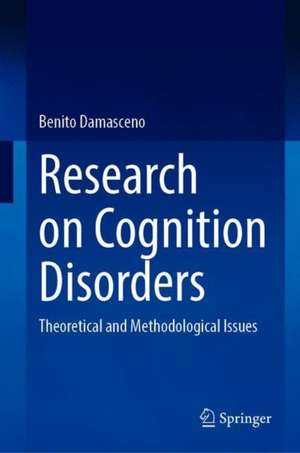Research on Cognition Disorders: Theoretical and Methodological Issues
Autor Benito Damascenoen Limba Engleză Hardback – oct 2020
Subsequently, methodological issues are examined, including the use of the systemic and network approach in neuropsychological research, the concepts of single and double dissociation, single-case versus group studies, problems of brain-behavioral correlations using the lesion method and functional neuroimaging, the influence of task-relevant variables (confounders) related to the patient (e.g., age, education), to the lesion (size, etiology), and to the tests and testing conditions (ecological validity, examiner´s experience). Finally, readers are given the fundamentals of statistics applied to biomedical and psychological research, with illustrative examples of how to calculate Z score, effect size, χ2 test, t test, Pearson´s correlation coefficient, and simple linear regression. Methodological problems in current cognitive research on early multiple sclerosis, medial temporal lobe epilepsy, mild cognitive impairment and dementia are examined in detail.
Preț: 387.31 lei
Nou
Puncte Express: 581
Preț estimativ în valută:
74.15€ • 76.25$ • 61.51£
74.15€ • 76.25$ • 61.51£
Carte tipărită la comandă
Livrare economică 19 februarie-05 martie
Preluare comenzi: 021 569.72.76
Specificații
ISBN-13: 9783030572655
ISBN-10: 303057265X
Pagini: 245
Ilustrații: XX, 245 p. 17 illus.
Dimensiuni: 155 x 235 mm
Greutate: 0.55 kg
Ediția:1st ed. 2020
Editura: Springer International Publishing
Colecția Springer
Locul publicării:Cham, Switzerland
ISBN-10: 303057265X
Pagini: 245
Ilustrații: XX, 245 p. 17 illus.
Dimensiuni: 155 x 235 mm
Greutate: 0.55 kg
Ediția:1st ed. 2020
Editura: Springer International Publishing
Colecția Springer
Locul publicării:Cham, Switzerland
Cuprins
Chapter 1. Introduction.- Part I. Cognitive functions and their interrelationships.- Chapter 2. Sensation and Perception.- Chapter 3. Attention.- Chapter 4. Memory.- Chapter 5. Language.- Chapter 6. Cognition as a mediated, self-organized, and dynamic activity.- Part II. Historical-cultural origin of cognition.- Chapter 7. Evolutionary perspective.- Chapter 8. Ontogenetic perspective.- Chapter 9. Role of imitation and appropriation in the cognitive development.- Chapter 10. Acquisition of theory of mind, language, and social cognition.- Part III. Neuropsychological Investigation: Methodological Issues.- Chapter 11. Systemic approach and the problem of reciprocal influences of mental functions on each other.- Chapter 12. Brain-behavioral correlations.- Chapter 13. Research methods and designs.- Part IV. Fundamentals of Statistics applied to biomedical and psychological research.- Chapter 14. Elements of statistics: Basic concepts.- Chapter 15. Fundamentals of statistical analysis.-Chapter 16. Hypothesis testing.- Chapter 17. Choosing a statistical test.- Part V. Methodological issues in research on selected conditions.- Chapter 18. Cognitive research on early multiple sclerosis.- Chapter 19. Temporal lobe epilepsy.- Chapter 20. Mild cognitive impairment and early dementia.
Notă biografică
Benito Pereira Damasceno, M.D., has been a full professor of neurology in the Department of Neurology, State University of Campinas (UNICAMP), Brazil, since 2006, after being assistant professor and coordinator of the neuropsychology and neurolinguistics unit since 1986. He served as head of the neurology department from 1994 to 1998 and from 2006 to 2008. He has served as reviewer of international journals as Epilepsia, International Psychogeriatrics, Cerebral Cortex, PlosOne, Arquivos de Neuropsiquiatria, Dementia & Neuropsychologia, and Journal of Neurology, Neurosurgery & Psychiatry, and has published more than 105 articles in international peer-reviewed journals. His main areas of research are Alzheimer´s dementia, multiple sclerosis, aphasias, theory of mind, memory, and epilepsy neuropsychological evaluation.
Textul de pe ultima copertă
Research on cognitive disorders is challenging due to the complexity of functions and numerous variables involved. The main purpose of this book is to effectively address the methodological issues and controversies in cognitive disorders research. First, it reviews the concept of human cognition as a complex activity involving interconnected mental and cerebral processes (its systemic structure), which represent the natural and social-cultural world by means of signs (its mediated, semiotic nature) and result from the internalization (or appropriation by the individual) of external actions and relations with things and persons (its cultural-historical origin).
Subsequently, methodological issues are examined, including the use of the systemic and network approach in neuropsychological research, the concepts of single and double dissociation, single-case versus group studies, problems of brain-behavioral correlations using the lesion method and functional neuroimaging, the influence of task-relevant variables (confounders) related to the patient (e.g., age, education), to the lesion (size, etiology), and to the tests and testing conditions (ecological validity, examiner´s experience). Finally, readers are given the fundamentals of statistics applied to biomedical and psychological research, with illustrative examples of how to calculate Z score, effect size, χ2 test, t test, Pearson´s correlation coefficient, and simple linear regression. Methodological problems in current cognitive research on early multiple sclerosis, medial temporal lobe epilepsy, mild cognitive impairment and dementia are examined in detail.
Subsequently, methodological issues are examined, including the use of the systemic and network approach in neuropsychological research, the concepts of single and double dissociation, single-case versus group studies, problems of brain-behavioral correlations using the lesion method and functional neuroimaging, the influence of task-relevant variables (confounders) related to the patient (e.g., age, education), to the lesion (size, etiology), and to the tests and testing conditions (ecological validity, examiner´s experience). Finally, readers are given the fundamentals of statistics applied to biomedical and psychological research, with illustrative examples of how to calculate Z score, effect size, χ2 test, t test, Pearson´s correlation coefficient, and simple linear regression. Methodological problems in current cognitive research on early multiple sclerosis, medial temporal lobe epilepsy, mild cognitive impairment and dementia are examined in detail.
Caracteristici
Pursues a historical-cultural, mediated, and systemic approach to cognition and its relevance for research on cognitive disorders Offers a comprehensive and detailed examination of study designs and influential variables to be controlled in the neuropsychological evaluation and included in multivariate statistical analysis Examines the critical analysis of methodological problems in areas that are currently the subject of intensive cognitive research
